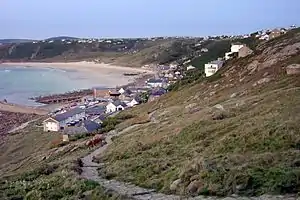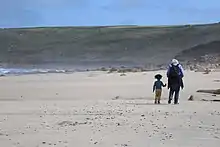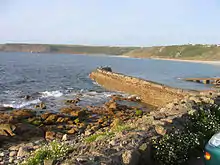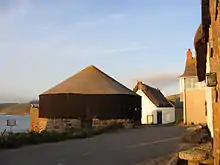Sennen Cove
Sennen Cove (Cornish: Porthsenen)[1] (grid reference SW352261) is a small coastal village in the parish of Sennen in Cornwall, England, United Kingdom. According to the Penwith District Council, the population of this settlement was estimated at 180 persons in 2000.[2] The South West Coast Path passes through Sennen Cove.

Geography
The village of Sennen Cove overlooks the southern end of Whitesand Bay. There is not a cove in the usual geological sense. The village (as distinct from Sennen Churchtown), is on a spur road which joins the A30 trunk road about two miles (3 km) from Land's End. Thus it is the first village from Land's End along the north coast. The road descends gently for about 300 yards and then steeply for another 300 yards to the village which lies above the beach. The beach extends further north along Whitesand Bay. There are a few dozen houses built primarily of granite and some of concrete, arranged mainly in terraces, typical of many of the villages in Cornwall. Several submarine telecommunications cables reach land at Sennen Cove and are connected via landlines to the cable terminating equipment at Skewjack together with others from Porthcurno.
Sea and seashore

Lifeboat
Sennen Cove Lifeboat Station is a Royal National Lifeboat Institution base founded in 1853. It is run by volunteers and operates a Tamar-class all-weather lifeboat and an IB1 inshore lifeboat. They are manned by a crew of 24 people who ensure that the boats are operational and on call 24 hours a day, throughout the year.[3] Next to the lifeboat station is the restored Roundhouse, now used as an art gallery and souvenir shop, but originally used to house a winch for hauling boats up from the beach.
Surfing

Sennen Cove has become renowned for its surfing conditions and is highly regarded by local and non-local surfers alike. Sennen tends to be slightly more protected from winds and swell than Gwenver at the other end of Whitesand Bay. Sennen is good at most tides, except extreme high tide, but works best with a westerly swell and a light easterly wind. Surf gear can be hired at the beach, next to a car park and beach café.
Bilbo the canine lifeguard
The beach was home to Bilbo, the first ever UK canine lifeguard. The Newfoundland first started working on the beach in 2005, but the dog was suspended from service on the beach when the lifeguards were taken over by the RNLI in early 2008 (see below), because Bilbo was not being allowed to walk on the sand (the beach is strictly dog free in the summer), and the new RNLI regulation that restricts the carrying of more than one person (or dog) on the beach's quad bike. During the three years he was in service (2005–2007), he raised many tourists' awareness of the dangers of swimming outside the designated zones controlled by the lifeguards, led by the 'Bilbo Says' campaign.[4] Since the restriction of just 4 hours a week in 2008, there has been a public cry for Bilbo's reinstatement. A number of petitions have been posted online, and a paper petition has been created inside the Old Success Inn, Sennen Cove.
Bilbo died in May 2015, and his death was noted in many national newspapers and news sources.[5][6][7]
In 2005, the popular children's book Shanti The Wandering Dog of Sennen & The Land's End was published, and tells the story of a collie dog who goes off on his lone wanderings around Sennen Cove, whilst his owner, an old man who spends his day looking out to sea from his hill-top house window, snoozes. The old man never knows that Shanti goes off alone around the cove.
Alfie The MerCat of Sennen Cove is an illustrated story book by one of Cornwall's youngest published authors, Charlie Rose Elliott Peake. The story has a subtle sea-safety message and is about a ginger feral kitten named Alfie whose life is literally transformed by some mermaids who live in the bay.
Economy

The village is heavily dependent on tourism and is particularly popular with sea surfing enthusiasts. The main tourist season runs from spring until autumn, peaking in the school holidays in August. "The Old Boathouse", a surf shop called "Chapel Idne", and a public house are located here as well as various small cafes, ice cream stands, souvenir shops, and small private art galleries, including The Round House, most of which are only open during the tourist season. The South West Coast Path passes through Sennen Cove, being about half an hour's walk from Land's End.
On 8 June 1881 the Faraday landed the eastern end of the trans-atlantic cable known as the "Direct American line". A temporary hut was erected about 30 yards (27 m) west of the Cowloe Rocks. immediately below the ″hevva″ station (seine fishery) and close to the road leading out of the cove.[8] The western end of the cable was at Sable Island, off Canada.[9]
A small fishing fleet of seven is protected by a breakwater built in 1908.[10] Mullet used to be an important catch in the bay with the fishery beginning at the end of January and continued towards the end of April.[11] Sennen Cove was the most important seine fishery in Cornwall and, in Edwardian times, large schools were still entering the bay with as many as 12,000 caught at one time.[12] Seining continued into the 20th century with 1200 stone caught on 3 March 1977.[13]
The area of cliffs known as "Pedn men du" in the cove is also popular with rock climbers, having non-tidal access.[14]
Transport
First South West runs bus services to Sennen Cove. Service A1 calls at Sennen Cove on the journey between Penzance and Lands End roughly every hour during the daytime. In summer, open top bus A3 calls into the cove on the trip between St Ives and Lands End. Until their demise in 2006, Sennen Cove was a popular destination with enthusiasts of the Bristol VR bus due to the steep incline leaving the cove.
Music
Shoegaze indie-rock band from the UK, Ride titled a track in their 1990 album Nowhere after Sennen Cove, named 'Sennen'.
Art
The horizon at Sennen serves as the inspiration for a collection of 365 paintings entitled "Sennen: A Moment in Time" by renowned abstract artist Tony Davie.
References
- Place-names in the Standard Written Form (SWF) : List of place-names agreed by the MAGA Signage Panel Archived 15 May 2013 at the Wayback Machine. Cornish Language Partnership.
- Penwith District Council 2000 estimate Archived 9 November 2006 at the Wayback Machine
- "Sennen Cove Lifeboat". Sennen-cove.com. Retrieved 5 October 2016.
- "Bilbo Says Campaign". Bilbosays.com. Retrieved 5 October 2016.
- Rkaina, Sam (21 May 2015). "Bilbo the giant Newfoundland hailed as Britain's most famous lifesaving dog has died - Mirror Online". Mirror.co.uk. Retrieved 5 October 2016.
- "Lifesaving Sennen beach dog, Bilbo, dies - BBC News". Bbc.co.uk. Retrieved 5 October 2016.
- Owner Steve Jamieson. "Britain's first lifeguard dog has died | UK | News | Daily Express". Express.co.uk. Retrieved 5 October 2016.
- "Laying The English End Of The Direct American Cable". The Cornishman (153). 16 June 1881. p. 7.
- "Laying A New Atlantic Cable From The Land's End To Nova Scotia". The Cornishman (148). 12 May 1881. p. 7.
- Lenton, W. S. (2006) The Fishing Boats and Ports of Cornwall. Plymouth: Channel View Publishing Plymouth.
- SYMONS, J. 1875. Appearance of Grey Mullet during corresponding periods and quantities of fish caught at Sennen Cove in 1874-1875. Report of the Royal Institution of Cornwall p. 212
- CLARK, J. (1909) An annotated list of Cornish fishes. Zoologist. Offprints from papers in 1907 & 1908.
- Western Morning News. 4 March 1977
- "UKC Logbook - Sennen". Ukclimbing.com. 16 October 2015. Retrieved 5 October 2016.
Further reading
- Leach, Nicholas (2003) Sennen Cove Lifeboats: 150 years of lifesaving. Stroud: Tempus ISBN 0752431110
• The True Story of Bilbo The Surf Lifeguard Dog, by Steve Jmo and Janeta Hevizi, published by Cornish Cove Publishing
• Shanti The Wandering Dog of Sennen & The Land's End, by Janeta Hevizi and Jo Holland, published by Cornish Cove Publishing
Gallery
 Surfers in sea at Sennen
Surfers in sea at Sennen Surfer Coming from Sea Sennen Cornwall
Surfer Coming from Sea Sennen Cornwall People enjoying at Sennen Cove Beach
People enjoying at Sennen Cove Beach The far end of Sennen Cove Beach
The far end of Sennen Cove Beach Sand at Sennen Cove Beach
Sand at Sennen Cove Beach Sennen Cove Beach
Sennen Cove Beach Waves at Sennen Cove Beach
Waves at Sennen Cove Beach Beautiful Scene at Sennen Cove Beach
Beautiful Scene at Sennen Cove Beach Toddler at Sennen Cove Beach
Toddler at Sennen Cove Beach Sennen Cove Beach
Sennen Cove Beach
